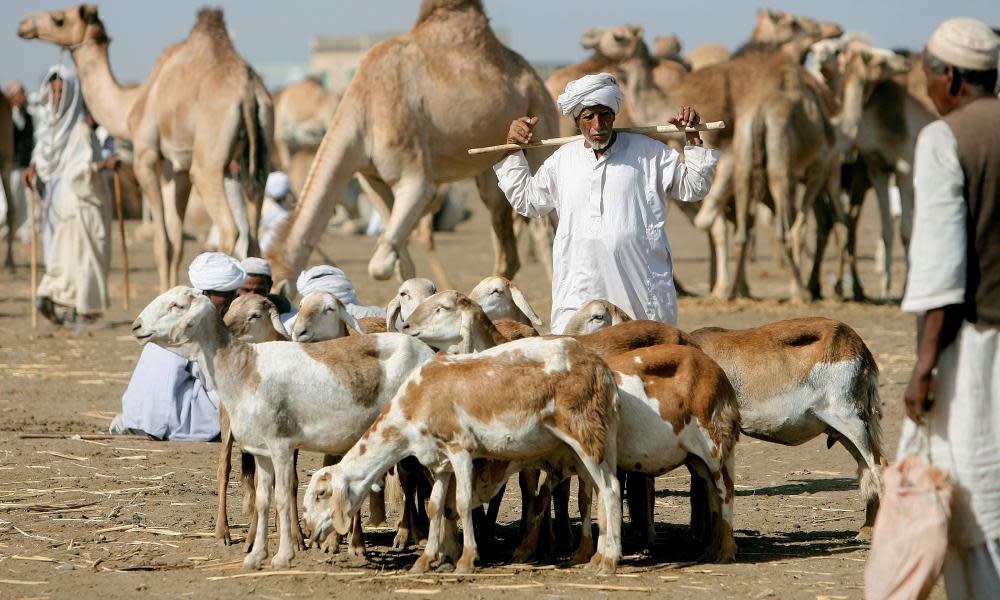'It was painful to declare it': outbreak of animal disease was blow to Sudan exports

Thousands of sheep waiting to be exported ended up dying of hunger and thirst, after an outbreak of Rift Valley fever led to a temporary Saudi block on trade.
The appearance of the disease in any country that depends on the export trade is potentially catastrophic. Countries are supposed to notify the World Organisation for Animal Health (OIE), which will then place restrictions on their trade.
Sudanese government ministers admit it was a difficult decision to send the notification, knowing that it would have profound economic effects. The outbreak has now been declared over.
Over the next week the Guardian’s Animals Farmed series will focus on the global live animal export trade, which, despite welfare and disease concerns, has quadrupled over the last fifty years.
Nearly 2 billion animals a year are loaded onto trucks or ships and sent off to new countries on journeys that can take weeks.
Every day at least 5 million creatures are in transit, in a secretive global trade in live farm animals.
And those numbers are just the cross-border journeys. They do not include long journeys within countries, which are becoming more frequent due to a trend that has seen smaller slaughterhouses close down.
We’re taking a moment to focus on some of the implications of this global trade.
Live animals are one of Sudan’s most important exports, bringing in approximately $500 million (£384,620) in 2018, according to the International Trade Centre.
But in September last year, Sudan informed the OIE that Rift Valley fever had found its way into the country. In October Saudi Arabia, which buys more than 70% of its livestock from Sudan, announced a ban on imports.
The ban had a devastating effect on farmers and exporters, who were forced in some cases to sell their animals at half the usual price.
Siddiq Hedob, a member of an independent livestock exporters’ body in Khartoum, estimated that about 30% of the exporters in Sudan “have lost money”.
“When the minister of health announced the decision, there were about 80,000 sheep at Port Sudan waiting to be transferred to Saudi but it didn’t happen, even though they were all healthy,” Hedob said. “So they spent about four days without food or drinking water and many of them had died and were thrown in the sea.” However, other sources denied that animals had been disposed of in the water.
Exporter Abdelrahman El-Shaeekh said thousands of his cattle were being kept in Omdurman city, which was costing him a lot of money. He did not know when exactly they could be sent off to Saudi Arabia.
Related: 'Live animals are the largest source of infection': dangers of the export trade
“I have 6,000 sheep and I had to keep them in Omdurman. Each cost me 40 Sudanese pound (£0.70) a day for food and drink, apart from what I pay for the vet,” he said.
Rift Valley fever is a disease that affects both humans and animals: it is transmitted by mosquito and leads to miscarriage and sometimes death in animals. A vaccine for both humans and animals exists.
The disease has been moving across east Africa for the last couple of years and the World Health Organization has been among the agencies monitoring its progress and warning of possible economic impacts.
A Sudanese government official said notifying the OIE had been the correct decision.
Minister of Health Dr Akram Altoum told the Guardian: “When I first consulted the minister of finance, foreign minister, animal resources minister, trade and the industry, and the local governments, we agree[d] that yes this is painful, but please go ahead and declare. We felt it had to happen, it’s a principle.”
“It would cost our economy thousands of dollars and a whole market of exports, but we had to do it. We didn’t do it with any expectations of reward, but it came with its own reward. We collaborated with countries like Saudi Arabia and the Gulf Cooperation Council and they helped to control the disease. Thanks to the vaccine and the technical support they gave us … it will be behind us.”
It is believed that other countries have been less rigorous about notifying the authorities about suspected outbreaks. Questions have long been asked about the mysterious absence of African swine fever from Belarus, for example, which is entirely surrounded by countries that have suffered severe epidemics.


